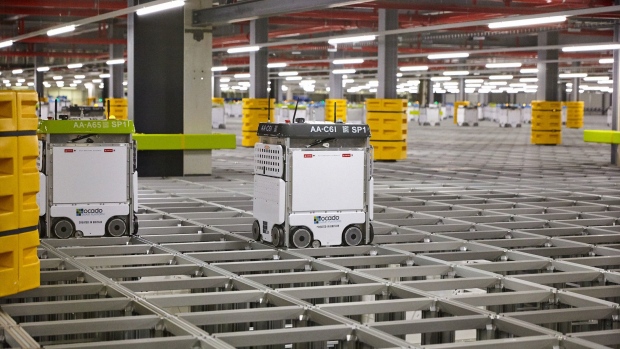Ocado Wins U.S. Trade Case Brought by AutoStore Over Robots
, Bloomberg News

(Bloomberg) -- Ocado Group Plc won a trade case lodged by AutoStore Holdings Ltd. that threatened its plans to expand its robotic warehouses into the U.S.
AutoStore said it plans to appeal the International Trade Commission’s decision to the U.S. Court of Appeals for the Federal Circuit. Ocado shares rose as much as 11% in London Friday, while AutoStore dropped as much as 8.6% in Oslo.
The ITC affirmed with modifications a judge’s findings that three AutoStore patents are invalid and that Ocado doesn’t infringe a fourth. AutoStore asked the full commission to review the findings “to correct multiple legal mistakes.”
The two companies are seen as having the best chances for growth in the fast-developing market for automated warehouse robots. It’s led to a global battle over who has the rights to the underlying technology, with cases in Germany, the U.K. and the European Patent Office.
While the trade case isn’t the only dispute between the two in the U.S., it’s the one that has the greatest potential to disrupt Ocado’s plans in the world’s largest market. A London court is expected to rule on another legal dispute between the companies in coming weeks, Ocado said.
Ocado said it welcomed the ITC’s decision and that it expects to be awarded damages from AutoStore for allegedly infringing its patents.
“All 33 of the patent claims asserted against Ocado have now been confirmed for a second time to be either invalid or not infringed, demonstrating again how misguided AutoStore’s complaint has been,” Ocado said.
AutoStore in a statement said it “believes strongly in its litigation positions and will continue to pursue them.”
Ocado said in its annual results that it’s spent 29 million pounds ($39 million) on legal fees so far relating to its dispute with AutoStore.
Kroger Co., the biggest U.S. grocery chain, said in a Jan. 14 filing with the agency that it has customer fulfillment centers with Ocado machinery in three states with plans for seven more in the next six months.
An order banning Ocado’s robots “would prevent Kroger from delivering groceries from these facilities, result in the loss of thousands of current and future employees, and negatively impact many American citizens and communities,” Kroger said in the filing.
The three AutoStore patents found to be invalid relate to the robot body with an internal cavity to transport a storage bin. ITC Judge Charles Bullock found that, while Ocado used the technology, those claims failed to fulfill requirements of clearly describing the invention in a way that others can understand.
AutoStore argued that Bullock’s findings rested on him “disregarding clear evidence” and ignoring findings of the U.S. Patent and Trademark Office’s review board.
The Oslo-based AutoStore says its technology forms the basis of Ocado’s Smart Platform. Ocado contends that AutoStore’s Red Line system wasn’t good enough for the fast turnover of groceries, so it developed its own machines.
Autostore’s arguments to the trade agency “contort the facts and law in an attempt to manufacture ‘clear errors,’ for review, but they fail to identify any issue that warrants review,” Ocado said in a filing with the agency. It asked, however, that if the commission takes a second look at validity it also review the judge’s findings that Ocado infringed the patents.
The case is In the Matter of Certain Automated Storage and Retrieval Systems, Robots, and Components Thereof, USITC, No. 337-1228, 3/10/22.
--With assistance from Deirdre Hipwell and Katie Linsell.
To contact the reporters on this story: Susan Decker in Washington at sudecker1@bloomberg.net; Matthew Bultman in New York at mbultman@correspondent.bloomberglaw.com
To contact the editors responsible for this story: Jon Morgan at jmorgan97@bloomberg.net ; Renee Schoof at rschoof@bloombergindustry.com
(Updates with Ocado shares in second paragraph)
©2022 Bloomberg L.P.
No comments:
Post a Comment